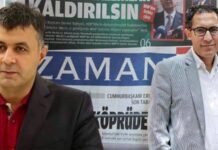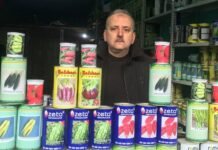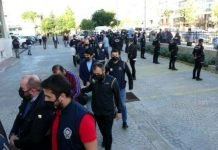Turkey’s Constitutional Court last week denied the request for release of Lütfi Koç (46), a political prisoner suffering from two brain tumors and a hernia, and the father of a fully disabled son, Bold Medya reported.
Koç was working at a private student dormitory that was associated with the Gülen movement, a faith-based group inspired by US-based Turkish cleric Fethullah Gülen. He was first detained in November 2018 on allegations that he was a member of the movement but was released due to the condition of his disabled son, Muhammed Yahya, who can’t see, talk or walk. Yet, a court arrested him in April 2019. He was convicted of membership in a terrorist organization in July 2019 and sentenced to eight years, 10 months’ imprisonment.
The Turkish government accuses the Gülen movement of masterminding an abortive putsch on July 15, 2016 and labels it a terrorist organization. The movement strongly denies involvement in the coup attempt or any terrorist activity. Following the allegations, Gülen called on the Turkish government to allow for an international investigation.
Following the coup attempt, the Turkish government declared a state of emergency and launched a massive crackdown on followers of the movement under the pretext of an anti-coup fight. Over 540,000 people were detained on terrorism-related charges, more than 80,000 were arrested or imprisoned and over 150,000 public servants were summarily removed from their jobs for alleged membership to or relationship with “terrorist organizations.” The purge mainly targeted people who were allegedly affiliated with the Gülen movement but included other people from a wide variety of backgrounds as well.
Koç fell ill 45 days after entering prison and rapidly lost weight. Following a series of tests, he was first diagnosed with a hernia and later two brain tumors. Doctors said they were unable to operate on the hernia for fear that the brain tumors might lead to permanent paralysis from the general anesthesia. He has been visiting the hospital intermittently for the past 84 days to obtain a health report from the hospital’s medical board.
As part of COVID-19 related measures, inmates who have any contact with outsiders are required to stay in a quarantine cell before returning to the general population. Yet, due to his hospital visits Koç has been in the quarantine ward for the past 84 days without the possibility of going out into the yard, watching TV or enjoying warm beverages.
His 11-year-old daughter also has serious health problems. She was diagnosed with muscular dystrophy, a group of diseases that cause progressive weakness and loss of muscle mass, two years ago.
Turkey’s Constitutional Court denied Koç’s petition to be released for health reasons last week, citing a lack of life-threatening conditions.
His wife Züleyha Koç said: “His lawyer said my husband’s condition is not good, neither psychologically nor in terms of his general health. In fact, doctors had told us the tumors could cause psychological problems and could greatly affect his life. He also has a loss of vision in his left eye.
The violation of prison inmates’ basic rights in Turkey is one of the topics raised frequently by activists and human rights defenders. In the past two weeks two prisoners, journalist Mevlüt Öztaş and TV director Fatih Terzioğlu, succumbed to cancer they developed in prison and for which they could not get proper treatment. Both were refused the postponement of their sentences they were entitled to and were belatedly released despite medical reports attesting to the fact that they were unfit to remain in prison.
According to the Human Rights Association (IHD), there are currently 1,605 sick prisoners in Turkish prisons, 604 of whom are critically ill. Although most of the seriously ill patients have forensic and medical reports deeming them unfit to remain in prison, they are not released. In the first eight months of 2020, five critically ill prisoners passed away because they were not released in time to receive proper medical treatment.
In an interview with the Kronos news website, human rights defender and pro-Kurdish Peoples’ Democratic Party (HDP) deputy Ömer Faruk Gergerlioğlu noted that these deaths are caused by belated release, adding: “These deaths are acts of murder. The ruling party is the murderer and state institutions along with the Ministry of Justice involved in this wickedness are accomplices to the crime.”
















